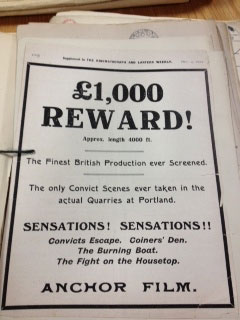The British Board of Film Censors was established 100 years ago, on 1 January 1913, to censor films “which may be considered in any way opposed to the better feelings of the general public”.

Film poster for '£1,000 Reward' (reference HO 45/10551)
Home Office files in The National Archives record the establishment of the British Board of Film Censors and reveal some instances where the government was concerned about the influence of film and its perceived link to an increase in crime.
The film ‘£1,000 Reward’ by Pathé, which wanted to film an escape from Portland Prison, was subject to consideration by the Home Office following a letter from an official at Portland Prison in which it claimed that “such exhibitions may be detrimental to the good Government and control of the Prison.” The letter from the Home Office on the matter also states that: “There is a risk that prisoners’ friends may be encouraged to traffic with officers in order to furnish them with tobacco, even if with no more serious purpose.”
In HO 45/10551, there is a file entitled ‘Juvenile Crime due to Cinematographs’ which concerns an incident reported by the Chief Constable in Hull about four boys aged between 13 and 15 who burgled 13 houses while in possession of several revolvers, false whiskers and moustaches. The Chief Constable reports that the boys informed the manager of the Detention Centre, where the boys were held upon arrest, that they got the idea for “their adventures”, as the boys put it, from ‘cinematograph pictures’ (as films were referred to at the time).
The file also reveals that, while the government had no data to link the increase in juvenile crime to ‘cinematograph pictures’, it “seems not unlikely”. Following a question in the Houses of Parliament about the incident and whether the Government would introduce “legislation dealing with the evil”, the then Secretary of State for the Home Office assured fellow members of Parliament that a committee, which would become the British Board of Film Censors, was in the process of formation.
By the end of its first year the British Board of Film Censors had rejected over 22 films in their entirety for one or more of the following reasons:
a) Indelicate or suggestive sexual situations
b) Indecent dancing
c) Holding up a minister of Religion to ridicule
d) Cruelty to animals
e) Indelicate accessories in the staging
f) Judicial executions
g) Excessive drunkenness
h) Subjects depicting procuration, abduction and seduction
i) Native customs in foreign lands abhorrent to British ideas
j) Impropriety in conduct and dress
k) Materialisation of Christ or the Almighty
It is a pity we got so free and easy in the latter part of the 20th Century. Almost anything goes now!